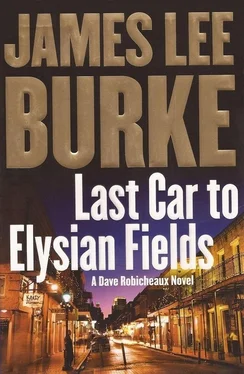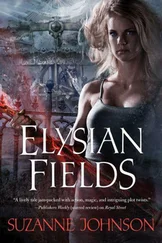Later the same morning, Helen Soileau and I and another plain-clothes served the search warrant on Dr. Parks at his home. His face looked sleepless; he had just finished shaving and a piece of bloody tissue paper was stuck to a cut on his chin. He stared at the warrant incredulously. “Search for what?” he said.
“Let’s start with your shoes. Take them off, please,” I said.
He stared long and hard at me, then the resolution seemed to go out of his eyes. He sat on a footstool in the living room and unlaced each of his black dress shoes and handed them to me. The shoes were new and the leather on them was buffed and smooth and bright as mirrors. “Let’s take a look in your closet, Doctor,” I said.
We went inside the master bedroom. The curtains were closed, the air oppressive. I felt almost claustrophobic inside the room. “Could you open the curtains, please?” I said.
He started to turn on the overhead lighting.
“No, sir. Open the curtains,” I said.
“Why?” he said.
“Because I see better with natural light,” I said.
When he pulled back the curtains the room was immediately flooded with sunshine. The window gave onto a patio and a beautiful view of the bayou and the live oaks in the side yard. But the potted plants on the patio were dead, the glass-topped table marbled with dirt and the dried rings of evaporated rainwater. Helen and I pulled all the shoes out of the closet and bagged two pairs of black ones.
Dr. Parks sat on the side of the bed, his shoulders rounded. His wife opened the bathroom door, looked at us briefly, then closed it again.
“Look, you’ve got your job to do. I accept that. But I heard...” he said.
“Heard what?” I said.
“You people found the gun that killed the daiquiri-shop operator,” he said.
“The man who owns the weapon makes a convincing case it was stolen,” I said.
“You think I go around stealing guns from people?”
“You attend gun shows, Dr. Parks?” Helen asked.
“Sure. All over the country.”
“Ever buy a firearm at a tailgate sale?” she asked.
He rubbed his brow. “It’s hopeless, isn’t it?” he said.
“What do you mean?” I said.
“I’ve heard about stuff like this. You can’t make your case and you zero in on the survivors of the victim,” he said.
There were many rejoinders either Helen or I could have made. But you don’t break off the barb of a harpoon in a man who has already been ripped from his liver to his lights.
We got back in the cruiser and crossed the drawbridge in Loreauville, then headed up the state highway toward New Iberia. We passed cane trucks and the old Negro quarters left over from plantation days and an emerald green horse farm with big red barns and pecan trees next to a white house.
“Why’d you want the curtains open back there?” Helen asked, watching the road.
“Their bedroom was like a grave. I couldn’t breathe.”
She glanced sideways at me.
“You didn’t feel it?” I asked.
“You worry me, bwana,” she said.
On Saturday morning I drove with Clete to New Orleans to check out his apartment, which he had loaned to Gunner Ardoin and his little girl. We crossed the Atchafalaya on the arched steel bridge at Morgan City, the docked shrimp boats and old brick buildings and tile roofs and palm-dotted streets of the town spread out below us in the sunshine. Then we drove into rain that seemed to blow out of the cane fields like purple smoke, and by the time we approached the giant bridge spanning the Mississippi, Clete’s Cadillac was shaking in the wind, the fabric in the top denting with hailstones.
We drove into the French Quarter and parked in front of his apartment on St. Ann. He ran through the rain and went upstairs into his apartment. A few minutes later he was back in the car, his brow knitted.
“Gunner taking care of the place?” I said.
“Yeah, everything looks fine,” he said.
“What’s wrong?” I said.
“He left a message on the machine. He said an Irish guy was asking around in the neighborhood a couple of days ago. A weird-looking dude with little ears. Gunner thought maybe this guy had business with me.”
“Max Coll?” I said.
“Yeah. I think Gunner’s got it wrong, though. Coll doesn’t have any reason to be interested in me. Gunner might get himself popped.”
“Where’s Gunner now?”
“He didn’t say. How do I get involved in crap like this?”
“Let’s have a talk with Fat Sammy.”
“I can’t stand that guy. He looks like a blimp after all the air has gone out of it.”
“There’re worse guys in the life.”
“Oh, I forgot, he gives discounts to the meth whores who work in his porn films,” he said.
He fired up the Caddy, the rust-eaten muffler roaring against the asphalt, and we drove in the rain to Fat Sammy’s house on Ursulines.
I rang the iron bell at the entrance.
“Who is it?” Sammy’s voice said from the speaker inside the archway.
“Dave Robicheaux,” I replied.
He buzzed open the gate and we walked through the flooded courtyard to the door of his house, which he had already unbolted and left ajar. I had not told Sammy that Clete was with me. When we stepped inside the living room he was lying on the floor, dressed in purple gym trunks and a strap undershirt, watching an opera on cable TV while he curled dumbbells into his chest. His massive legs were as white and hairless as a baby’s, his pale blue eyes looking at us upside down.
“What’s the haps, Sammy?” Clete said.
“Who said you could come in here, Purcel?” Fat Sammy asked.
Clete looked at me. “I’ll wait in the car,” he said.
“Clete’s my friend, Sammy.”
Sammy set down the dumbbells and got to his feet, his lungs wheezing.
The living room was dark, the windows covered with thick velvet curtains. Through a side door I could see two men, neither of whom I recognized, shooting pool. Sammy looked down from his great height at both me and Clete.
“So you want to watch some opera?” he asked. He spread his feet and began touching his toes.
“You know a guy named Max Coll?” I said.
“Do I know him? No. Do I know who he is? Yeah, he works out of Miami ‘cause it’s suppose to be an open city there. Here’s the short version. You want somebody clipped, there’s guys in Little Havana who work for a service. You want it done right, you ask for this Irish character. Except some people say he’s a wacko.”
Out of the corner of my eye I saw Clete staring intently through the side doorway at the two men shooting pool.
“Wacko how?” I said.
“I don’t know, ‘cause I don’t keep company with them kind of people,”
Sammy said. “Look, what I hear is the wacko screwed up a job in New Orleans and stiffed the wrong people. That means if he goes back to Miami he might float up in a barrel. Now, we done with this?”
“The guy in there with the patent-leather hair? Is that Frank Dellacroce?” Clete asked.
“What about it?” Sammy said.
“Nothing. I thought he was down on a murder beef in Texas. Maybe George W. slipped up during his days as chief needle injector,” Clete said.
Sammy’s eyes looked at nothing while he scratched at his cheek with three fingers. “Come back another time, Robicheaux,” he said.
Outside, rain was sluicing off the rooftops while Clete and I ran for his Cadillac. We got inside and slammed the doors. “Why do you always have to start up the garbage grinder?” I said.
“That grease ball shooting pool put his infant daughter in the refrigerator and held a gun to his wife’s head while he did it. You think Sammy is on the square? I think he’s a fat douche bag who should have been blown out of his socks years ago.”
Читать дальше












